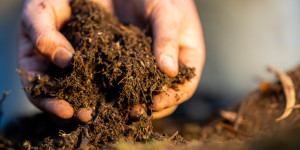With huge growth potential, Manuka Bioscience - alongside Callaghan Innovation - is developing and testing using mānuka oil to more effectively treat skin infections.
At a glance
- With a growing resistance to antibiotics for infections, Manuka Bioscience has been exploring using oil from East Cape mānuka trees to develop treatments for skin infections.
- Callaghan Innovation has supported clinical trials with funding that helped the necessary lab work as well as R&D and business expertise.
- Manuka Bioscience have been able to develop a mānuka-oil based formulation that’s highly effective against the common staph and strep bacteria, as well as the antibiotic resistant staph, MRSA.
Over the last 12 months, we’ve initiated several new projects that will produce some important and near-term commercial results. We simply couldn’t have done any of this without the support of Callaghan Innovation.
- Dr Suki Harding, Director and Head of R&D, Manuka Bioscience
Fighting infections with mānuka oil
Skin infections are usually considered irritating rather than life-threatening. But skin diseases like impetigo can develop into something much more serious.
Normal treatment for these types of infections is antibiotic skin creams, but there’s growing resistance to the creams that are rendering them ineffective. In fact, by 2050 it’s estimated that antibiotic-resistant infections could claim as many as 10 million lives globally each year.

One potential solution lies in the oil extracted from East Cape mānuka trees.
“East Cape mānuka oil has high levels of a chemical called beta-triketones with powerful antibacterial, antiviral, anti-fungal, anti-inflammatory and anti-aging properties,” says Dr. Suki Harding, Director and Head of R&D at Manuka Bioscience.
So, as well as their current range of ManukaRx branded products, Manuka Bioscience has been working with the country’s leading research organisations to develop treatments for more serious skin conditions using the oil.
Pushing forward R&D with Callaghan Innovation
In partnership with the Medical Research Institute of New Zealand, Manuka Bioscience received Health & Disability Ethics Committee (HDEC) approval and Standing Committee on Therapeutic Trials (SCOTT) approval to begin two stage II clinical trials.
These trials will see children aged 2-14 suffering from impetigo, and people suffering from eczema, treated with Manuka Bioscience proprietary mānuka oil-based formulations.
Callaghan Innovation has supported the trials and necessary lab work with grant funding as well as through extensive advice from our business and science leaders.
For example, members of our Research and Development Solutions’ Biotechnologies team were able to help resolve several technical challenges. As well, Dr Harding says, “Our Business Innovation Advisor Mark Robinson and Technical Support Manager Dr. David Clarke have been fantastic to work with. They are helpful, professional, supportive and responsive.”
Callaghan Innovation has also been able to help the business in other ways. With a capital raise for R&D coming to a halt during COVID-19, a R&D loan allowed the work to continue and the business to proceed with the capital raise plans in 2021. As well, we have supported a feasibility project exploring how to extract value from mānuka waste biomass, while simultaneously reducing its fire risk.
Furthering research, supporting health outcomes
Through the support of Callaghan Innovation, the Manuka Bioscience team have been able to successfully further their research into treating infections with mānuka-oil.
“Our research proves that we have a mānuka-oil based formulation that’s highly effective against the common staph and strep bacteria, as well as the antibiotic resistant staph, MRSA, known as the superbug, which is very tough to treat,” says Dr. Harding.
“Over the last 12 months, we’ve initiated several new projects that will produce some important and near-term commercial results. We simply couldn’t have done any of this without the support of Callaghan Innovation.”
The mānuka oil industry is currently a small one with just ten tonnes of oil produced each year. But given the increasing demand for botanical ingredients and proven therapeutic properties of mānuka oil, Dr Harding believes there’s huge growth potential in this sector, both as an export industry and a source of employment.
The science is also likely to prove crucial to Māori and Pacific Island communities, which are the hardest hit when it comes to impetigo in New Zealand.
“If we’re able to help improve the health of these communities and at the same time actively support the development of East Cape rural communities with jobs for local people, income for iwi landowners and educational programmes, it’s a huge motivator for us”, Dr. Harding says.




























